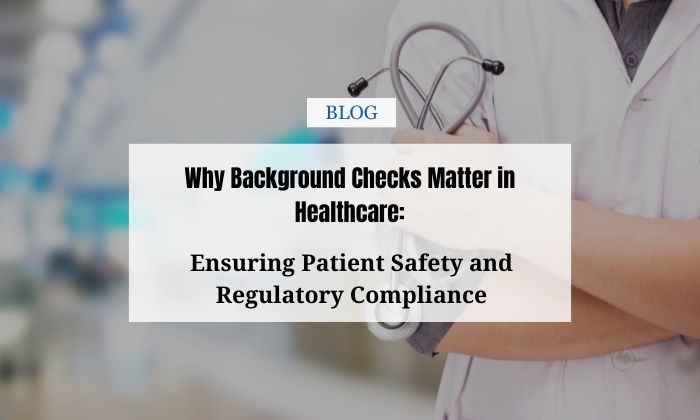In the healthcare sector, patient safety is paramount. One key aspect of ensuring this safety is conducting thorough background checks on healthcare employees.
Background checks serve as a critical tool in risk management. They help identify potential threats to patient safety, such as individuals with a history of malpractice or criminal behavior.
Moreover, regulatory compliance in healthcare mandates these checks. Non-compliance can lead to severe legal and financial repercussions for healthcare facilities.
In this article, we delve into why background checks are vital in healthcare, their key components, and their role in ensuring patient safety and regulatory compliance.
Work with a background check provider like Securecheck360
Here at Securecheck360, we’re experts in delivering reliable, fast turnaround and affordable Employment Background Screening Services, serving businesses of all sizes across the globe. Our customized solutions are finely tuned to meet the unique requirements of small, mid-sized, and large organizations. We’re dedicated to equipping companies with the vital tools and insights they need to make well-informed hiring choices. As one of the leading background verification companies, we’re committed to supporting even small businesses as trusted background check companies for small businesses to ensure they have the confidence to build the best teams for their success.
To know more about our services, book your free demo today!
The Imperative of Background Checks in Healthcare
Background checks in healthcare are not just a formality. They are a critical step in maintaining a safe environment for patients.
These checks help prevent the employment of individuals with a history of malpractice or criminal behavior. This is crucial in a sector where trust and safety are of utmost importance.
Moreover, background checks are part of a broader strategy to ensure the integrity and professionalism of the healthcare workforce. They help healthcare organizations maintain a trustworthy staff.
In essence, background checks are a cornerstone of patient safety measures in healthcare.
Key Components of Healthcare Background Checks
Healthcare background checks are comprehensive. They delve into various aspects of an individual’s past.
These checks are not limited to criminal history. They also include verification of educational credentials and drug testing.
The aim is to ensure that healthcare employees are not only qualified but also fit to work in a sensitive environment.
Here are some key components of healthcare background checks:
- Criminal history and sanctions
- Credentialing and educational verification
- Drug testing and health screening
Criminal History and Sanctions
A criminal history check is a standard part of background checks. It reveals any past criminal behavior that could pose a risk to patients.
Sanctions or disciplinary actions taken against healthcare professionals are also checked. This helps identify individuals who may have violated professional or ethical standards.
Credentialing and Educational Verification
Credentialing is a crucial part of healthcare background checks. It verifies the qualifications and history of healthcare professionals.
Educational verification ensures that the individual has the necessary training and education for the role. It helps maintain the high standards expected in healthcare.
Drug Testing and Health Screening
Drug testing is another important component. It helps identify individuals who may be struggling with substance abuse.
Health screening, on the other hand, ensures that healthcare employees are physically fit for their roles. This is particularly important in roles that require physical stamina and resilience.
Regulatory Compliance: A Non-Negotiable Aspect
Regulatory compliance in healthcare is non-negotiable. It’s a critical aspect of patient safety measures.
Background checks are mandated by various federal and state laws. They are also required by accrediting bodies.
Non-compliance can result in severe legal and financial repercussions for healthcare facilities.
Adhering to Federal and State Laws
Federal and state laws dictate healthcare background check requirements. For instance, the Office of Inspector General (OIG) maintains a list of excluded individuals barred from federally funded healthcare programs.
Healthcare facilities must adhere to these laws. Failure to do so can lead to penalties and loss of funding.
The Role of Accrediting Bodies
Accrediting bodies like The Joint Commission also require background checks. They play a crucial role in maintaining the integrity of the healthcare workforce.
Non-compliance can result in loss of accreditation. This can severely damage a healthcare facility’s reputation and trustworthiness.
Risk Management and Patient Safety Measures
Risk management in healthcare involves identifying potential threats to patient safety. Inadequate employee screening is one such threat.
Background checks are a crucial part of this process. They help prevent the employment of individuals with a history of malpractice or criminal behavior.
Thus, thorough background checks are a key patient safety measure. They contribute significantly to a safe environment for patients.
Conclusion: A Culture of Safety and Trust
Background checks in healthcare are not just a regulatory requirement. They are a cornerstone of a culture of safety and trust.
By ensuring the integrity and professionalism of the healthcare workforce, they protect patients and uphold the reputation of healthcare institutions.
In conclusion, background checks are an indispensable tool in maintaining the highest standards of care in the healthcare industry.







